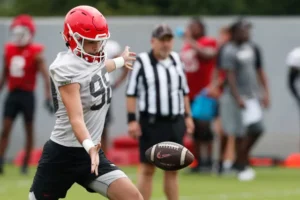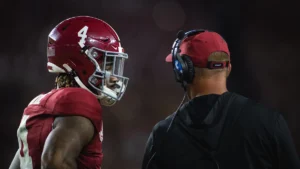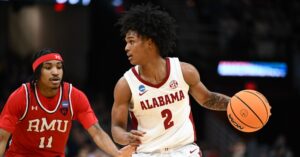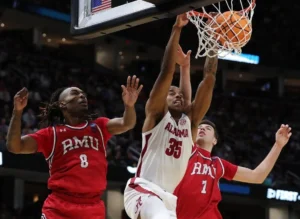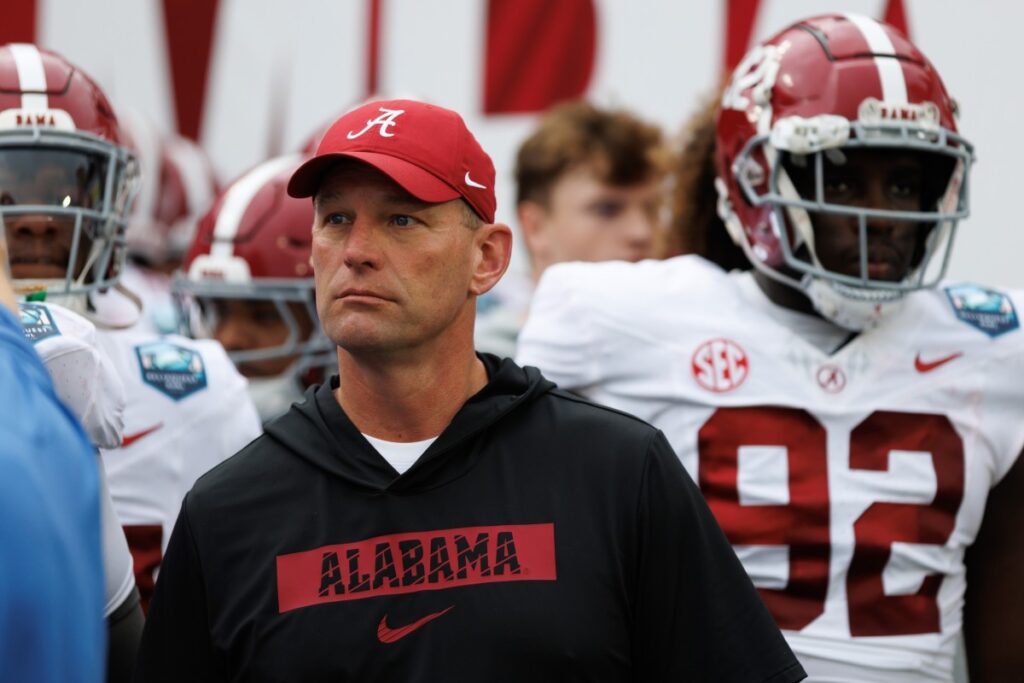
“Alabama’s Kalen DeBoer Makes It Clear: What He Doesn’t Want in a Quarterback Amid Fierce Competition”
As Alabama football turns the page from the Nick Saban era, new head coach Kalen DeBoer faces one of the most critical decisions of his early tenure in Tuscaloosa: choosing the right quarterback to lead the Crimson Tide. With spring practice sessions in full swing and a room filled with talent, experience, and raw potential, the spotlight naturally falls on the players battling for the starting role. But during a recent media session, DeBoer offered a rare insight—not just into what he wants in a quarterback, but more strikingly, what he doesn’t want. And in doing so, he may have shed more light on where this competition is heading than he intended.
DeBoer, who led Washington to a national championship appearance just months ago, brings with him a reputation as a quarterback whisperer. His track record includes the development of Michael Penix Jr. into one of the most prolific passers in college football. But at Alabama, the situation is different. He inherits a program steeped in success but undergoing transformation. The quarterback position is no exception, and the margin for error is razor-thin.
During his comments to the media, DeBoer was candid about the traits he expects from his signal-caller. But it was his firm declaration of what he wants to avoid that drew the most attention. “You can have all the arm talent in the world,” DeBoer said. “But if you’re careless with the football, if you’re not making smart decisions consistently, then you’re not the guy for us. We want someone who can take command, not just show off a skill set. Turnovers, indecision, lack of composure—those things kill drives and lose games.”
Those words weren’t just a philosophical statement; they were a clear message to every quarterback on the roster. Alabama’s current QB room includes Jalen Milroe, who started most of last season under Saban; Ty Simpson, a former five-star recruit who’s shown flashes of potential; and Dylan Lonergan, a redshirt freshman with an enticing combination of size and poise. Each brings something different to the table, but none have completely separated from the pack—yet.
Milroe is the most experienced of the group, having started 11 games last season and leading the Crimson Tide to an SEC Championship and a berth in the College Football Playoff. His dynamic athleticism and ability to make plays with his legs make him a threat to any defense. But inconsistency in the passing game and occasional head-scratching decisions have led to questions about whether he can thrive in DeBoer’s more timing-based, precision-oriented system.
Simpson, on the other hand, may be better suited to the scheme on paper. His smooth throwing motion and pocket presence were evident in limited action last year and during spring practices. But concerns linger about whether he can handle the pressure of SEC defenses week in and week out. For DeBoer, it’s not about just making the easy throws when the pocket is clean. It’s about whether a quarterback can stay sharp and composed when everything around him is collapsing.
And then there’s Lonergan, who may not be the immediate favorite but has reportedly impressed with his command of the offense and decision-making during spring drills. The former two-sport standout has a reputation for maturity beyond his years and an ability to process information quickly—two traits that align closely with DeBoer’s stated priorities.
What makes DeBoer’s stance so intriguing is that it emphasizes the mental and leadership aspects of playing quarterback, arguably more than the physical. “You can draw up the perfect play, but if the quarterback doesn’t understand situational football, if he panics under pressure, or tries to do too much—you’re in trouble,” DeBoer explained. “I want someone who understands when to take a shot and when to live for the next play. That’s the kind of football IQ that elevates an offense.”
That approach stands in contrast to some recent quarterback competitions in college football, where arm strength or athletic potential often becomes the headline factor. For DeBoer, who’s built a career on turning good quarterbacks into elite ones, the priority is building a consistent offensive identity. That starts with a quarterback who won’t derail drives with risky throws or poor situational awareness.
One source close to the Alabama program noted that DeBoer and offensive coordinator Nick Sheridan are putting a significant premium on practice habits, attention to detail, and ability to quickly adapt in meetings. “It’s not just about what you do on the field,” the source said. “It’s how fast you pick things up, how you carry yourself, and how you lead the other ten guys. They want someone who can be an extension of the coaching staff.”
That level of scrutiny may give an edge to a player like Simpson, who has long been lauded for his football IQ and dedication. But Milroe’s leadership within the locker room and proven resilience may also count heavily in his favor. After all, DeBoer is no stranger to coaching quarterbacks with different strengths. At Washington, Penix Jr. wasn’t the most mobile quarterback, but he was elite at reading defenses, making quick decisions, and keeping his cool in big moments. That blueprint may now serve as the model for Alabama’s next starter.
Of course, the challenge of installing a new offensive system complicates the evaluation process. Players are not only competing against each other, but also racing against the clock to master a playbook that’s very different from what they knew under Saban and former offensive coordinator Tommy Rees. DeBoer’s system relies heavily on route timing, pre-snap reads, and layered concepts. It rewards preparation and punishes hesitation. In that sense, DeBoer’s public comments serve a dual purpose: setting the tone for the locker room while also offering fans and media a glimpse into his coaching philosophy.
Notably, DeBoer’s expectations also suggest that this competition could extend well into the summer—and possibly even into the early weeks of the 2025 season. Unlike Saban, who often named a starter early to allow for continuity, DeBoer appears willing to wait as long as necessary to ensure he has the right man under center. “You don’t rush this,” he said. “You let the process play out, and the guy who consistently makes the right decisions, who earns the trust of his teammates—that’s the guy who wins the job.”
What complicates matters even more is the external pressure. Alabama fans, spoiled by years of elite quarterback play from the likes of Tua Tagovailoa, Mac Jones, Bryce Young, and Jalen Hurts, expect production and poise. Patience is rarely part of the equation. But DeBoer, who engineered dramatic turnarounds at Fresno State and Washington, is not easily rattled. He understands that success in the SEC requires more than flash—it requires precision and grit. And in his view, those traits start with the quarterback.
That mindset is already resonating with players, according to junior wideout Isaiah Bond. “Coach D is big on discipline,” Bond said after a recent practice. “He wants everything to be sharp—routes, timing, execution. He tells us the quarterback has to be the sharpest of all. That’s the standard.”
As the quarterback battle continues to unfold, the message from DeBoer remains clear: he’s not looking for a highlight-reel hero. He’s looking for a commander. Someone who can manage the offense, protect the football, and lead with conviction. Talent alone won’t win the job. It’ll be the one who embraces structure, thrives under pressure, and avoids the very pitfalls DeBoer has warned against.
Ultimately, that might be the most Nick Saban-esque trait DeBoer has brought with him—a relentless emphasis on process over hype. In a college football landscape that often rewards flair over fundamentals, DeBoer’s vision for Alabama’s next quarterback may feel like a throwback. But given his track record, it could be exactly what the Crimson Tide needs.
Until a starter is named, every snap, every meeting, and every moment will be part of the evaluation. And as DeBoer made perfectly clear, the decision won’t come down to who can throw the ball the furthest—it’ll come down to who makes the fewest mistakes when it matters most.
In the battle for Alabama’s most important position, it’s not about being the most talented. It’s about being the most trustworthy.
